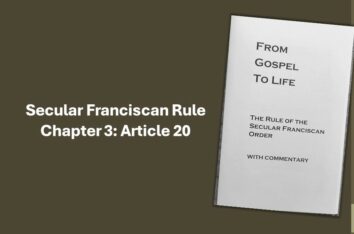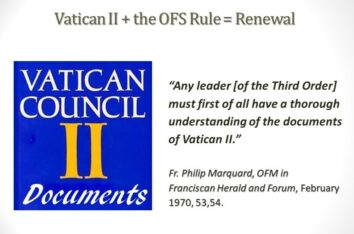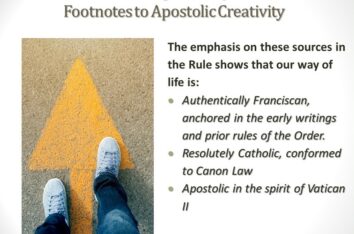Dear Brothers and Sisters,We are now studying the summary and guide to Part 4 of Instrumentum Laboris which addresses how to better animate and guide our fraternities. It addresses various questions that each fraternity needs to discuss. Again, Diane mentioned answering questions in a journal. This is important because each member can really think about the question then prepare their thoughts before the Gathering. This will make the group discussion more fruitful.(the previous Formation Fridays had the total download link for Instrumentum Laboris. If you want to have another link, just let me know.) Peace, Dona+++++++++++++++++++++++++++++++++++++++++++++++++++++++++++++++++++++++++++++++++++++++++++++++++++++++++
Instrumentum Laboris—Part 4 Animate and Guide: Challenges and Questions at Various LevelsThese posts (1-4) are intended to serve as a summary and guide to this important document. It is also intended to assist in the individual study of the document and in presentations made to our fraternities. We encourage you to read the entire document at this link: https://secularfranciscansusa.org/wp-content/uploads/Instrumentum-Laboris-2020.docx
World-wide challenges to be addressed
· The Secular Franciscan Order is a “Fraternity of Fraternities” spread all over the world. (See GC Article 1.3)
o National, regional, and local fraternities are of different sizes—in some countries the number of local fraternities is small so there are no regional fraternities yet.
o Fraternities at all levels may have different cultures and different languages.
o all levels of fraternity need to communicate properly.
· National Statutes regulate the existence of Regional Fraternities according to the norms of the General Constitutions.
· identify and recognize the responsibilities and duties of the OFS itself toward YouFra. (See IL section 5.2.6)
· Structure of all fraternities (local, regional and national) needs to be well-balanced
· Maintain focus on fraternal life, personal contacts, fraternal sharing among the members, and seeking God’s will within the fraternity
Challenges with Leadership [Concept of Servant Leadership was explained in part 2 of these posts.]
· Servant leadership should be modeled by those who animate and guide fraternities on various levels.
o Ways and techniques of leadership should be shared from one level to another.
· If there are difficulties, check to see what might be lacking:
o Possible lack of “core values” – Christian/Franciscan values
o Lack of Franciscan spirituality; basic human virtues
o Collegiality and collaboration—Minister and Council (including the Spiritual Assistant work TOGETHER)
· Roots and reasons for challenges with the concept of leadership
o Incorrect understanding of leadership and what the role of leaders should be
§ Leadership incorrectly seen as a “pious service” only
§ Creativity is missing among the leaders.
§ Minister and Council members act like bosses— we are called to service, not power
o Those who serve fraternities at all levels must be persons of prayer who seek the will of God and the good of all the brothers and sisters and the entire Order.
· Challenges with nominations and elections of excellent leaders
o Lack of capable persons (possibly because the fraternity is small; some are “hiding” their talents; too involved in other things)
o Acceptable reasons for not serving: Family or work responsibilities
· To prepare for elections, it is especially important that those who will vote (and those who will nominate and be nominated) understand the General Constitutions and the role our Councils play in the life of the fraternity.NEXT WEEK (March 12th): Bonus section on characteristics of a Servant Leader; proposals, and suggestions
Questions to discuss or to answer in your journal:
+ What suggestions can you make to improve the integration of cultural, language, and size differences in your local and regional fraternities?
+ In what ways do your local and/or regional servant leaders model good leadership techniques?
+ How can election preparation be improved in your local fraternity? In your region?
+++++++++++++++++++++++++++++++++++++++++++++++++++++++++++++++++++++++++++++++++++++++++++++++++++++++++++++++++++++++++++++++++++++
Instrumentum Laboris — Parte 4–Animar y guiar: Formación y comunicación 5 de marzo de 2021
Por favor, comparta con sus fraternidades locales.
Estas publicaciones (1-4) están destinadas a servir como resumen y guía para este importante documento. También está destinado a ayudar en el estudio individual del documento y en las presentaciones realizadas a nuestras fraternidades. Le animamos a leer el documento completo en este enlace:
https://secularfranciscansusa.org/wp-content/uploads/ES-Instrumentum-Laboris.pdf
Desafíos mundiales que deben abordarse
• La Orden Franciscana Seglar es una “Fraternidad de Fraternidades” esparcida por todo el mundo. (Ver artículo 1.3 de las CG)
o Las fraternidades nacionales, regionales y locales son de diferentes tamaños; en algunos países, el número
de fraternidades locales es pequeño por eso todavía no hay fraternidades regionales.
o Las fraternidades de todos los niveles pueden tener diferentes culturas y diferentes idiomas.
o Es importante que todos los niveles de la fraternidad se comuniquen correctamente.
• Los Estatutos Nacionales regulan la existencia de Fraternidades Regionales según las normas de las Constituciones Generales.
• Identificar y reconocer las responsabilidades y deberes de la propia OFS hacia la JuFra. (Consulte la sección 5.2.6 de IL)
• La estructura de todas las fraternidades (locales, regionales y nacionales) debe estar bien equilibrada
• Hay que mantener el enfoque en: la vida fraterna, los contactos personales, el compartir fraterno entre los miembros y la búsqueda de la voluntad de Dios dentro de la fraternidad.
Desafíos con el liderazgo [El concepto de liderazgo de servicio se explicó en la parte 2 de estas publicaciones].
• El liderazgo de servicio debe ser modelado por aquellos que animan y guían a las fraternidades en varios niveles.o Las formas y técnicas de liderazgo deben compartirse de un nivel a otro.
• Si hay dificultades, verifique qué puede faltar:
o Posible falta de “valores fundamentales” – valores cristianos / franciscanos
o Falta de espiritualidad franciscana; virtudes humanas básicas
o Colegialidad y colaboración: Ministro y Concilio (incluso el Asistente espiritual trabajan JUNTOS)
• Raíces y razones de los desafíos con el concepto de liderazgo.
o Comprensión incorrecta del liderazgo y cuál debe ser el papel de los líderes
— Liderazgo visto incorrectamente solo como un “servicio piadoso”
— Falta de creatividad entre los líderes.
— Los ministros y los miembros del Consejo actúan como jefes: estamos llamados a servir, no al poder.
o Quienes sirven a las fraternidades en todos los niveles deben ser personas de oración que busquen la
voluntad de Dios y el bien de todos los hermanos y hermanas y de toda la Orden.
• Desafíos con nominaciones y elecciones de líderes excelentes
o Falta de personas capaces (posiblemente porque la fraternidad es pequeña; algunos están “escondiendo”
sus talentos; demasiado involucrados en otras cosas)
o Razones aceptables para no servir: responsabilidades familiares o laborales
• Para prepararse para las elecciones, es especialmente importante que quienes votarán (y quienes nominarán y serán nominados) comprendan las Constituciones Generales y el papel que desarrollan nuestros Concilios en la vida de la fraternidad.
LA SEMANA PRÓXIMA (12 de marzo): ofreceremos una sección de bonificación sobre las características de un líder de servicio; propuestas, y sugerencias
Preguntas para platicar o responder en su diario:
+ ¿Qué sugerencias puede hacer para mejorar la integración de las diferencias culturales, lingüísticas y de tamaño en sus fraternidades locales y regionales?
+ ¿De qué manera sus líderes de servicio locales y / o regionales modelan buenas técnicas de liderazgo?
+ ¿Cómo se puede mejorar la preparación para las elecciones en su fraternidad local? ¿En su región?
Diane F. Menditto, OFSChair, National Formation Commission
Minister, Our Lady of the Angels Region


